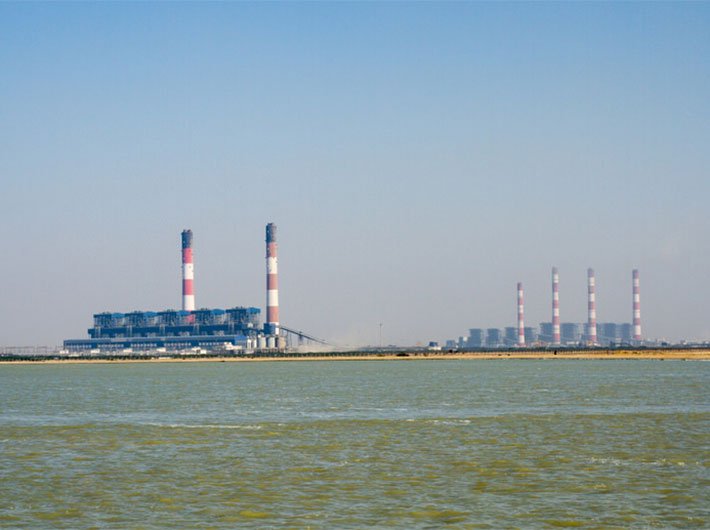In the process of establishing an ultra mega power project, CGPL has caused irreversible damage to the fragile ecosystem of Kutch
At a time when the biggest seller of weapons is bestowed with the Nobel Prize for Peace, when a narcissist and sexist is the Person of the Year 2016, it shouldn’t surprise anyone that Coastal Gujarat Power Ltd (CGPL) launched the bio-diversity club in Mundra. Mundra is home for India’s first Ultra Mega Power Project, fuelled by coal. In the process of establishing that project, the company ended up causing irreversible damage to the fragile ecosystem of Kutch.
In a complaint to the compliance mechanism of World Bank’s International Finance Corporation (IFC), the Compliance Advisor Ombudsman (CAO), the local fish workers’ organisation Machimar Adhikaar Sangharsh Sangathan (MASS) said,
“Kutch coast has its unique ecology teeming with biodiversity. It comprises of mangroves, coral reefs, mudflats, seaweeds, endemic and commercial fishes and other rare marine species. The mangroves of Kutch are the second largest after the Sunderbans in the mainland of India. A prominent feature of the Kutch Coast is the vast intertidal zone comprising a network of creeks, estuaries and mudflats. The Kutch coast provides a conducive environment for several sea based traditional occupations like fishing and salt making.”
The complaint filed in June 2011 further says,
“The ongoing construction of the project’s outfall channel is going to discharge wastes to three fishing grounds on which the fishermen from three different villages (Tragadi, Modhva and Kotda) do the livelihood activities. The width of the outfall channel is approximately 250 meters, which is almost the breadth of a river. The channel will block the creek (which is 5.5 km. long and 2.15 km wide). It will affect not only the fishing activities but also the 200‐250 hectares of mangrove forest. The outfall channel has already disturbed the two sand dunes since it is low and medium erosion zone. “
See pictures here
Pulling up IFC, one of the financiers of the project, for a shoddy job of complying and monitoring its own policies, in August 2013 the CAO in its report stated,
“…CAO has concerns as to the adequacy of IFC’s review of its client’s marine impact assessment process. Based on the requirements of PS6 and good international industry practice in the conduct of these types of assessments, areas in relation to which IFC might have been expected to query CGPL’s MEIAs and/or request further information include:
- The adequacy of the faunal assessment and whether this properly considered benthic biodiversity or habitat distribution.
- Absence of detailed mapping of natural habitats such as mangroves in the impact area (particularly Modhva Creek), identification of marine biotopes, their distribution and species diversity on a local scale.
- The adequacy of consideration given to conservation issues, in particular turtle nesting in the project area, which was reported as recently as 2006.
- The focus in the MEIAs on lethality as the primary significant impact on marine fauna, and the lack of consideration of the cumulative nonlethal effects of submarine noise, light, heat, and other aquatic disturbance from the project and associated facilities.
- Lack of analysis of the relationship between project’s marine impact and its impact on ecosystem services—in particular its impact on households that live seasonally on Tragadi and Kotadi bunders and derive a significant part of their livelihoods from in-shore fishing, as the Complainants assert to do; and more generally, the consistency of approach taken in the MEIAs with the objectives of PS6, and accepted EIA methods.”
Performance Standard (PS) 6 of IFC deals with Biodiversity Conservation and Sustainable Management of Living Natural Resources. It is one of the 8 PS that guide IFC’s investments.
It’s in this context one has to look at the launch of a bio-diversity club by CGPL. The Tata Power press release says, “…CGPL has been relentlessly working towards promoting bio-diversity and environment conservation in and around its plant sites.” It continues to say, “In line with this commitment, Tata power has signed an MoU with IUCN (International Union for Conservation of Nature) where CGPL has been considered as the learning hub.”
Purportedly put in place to address the serious gaps reported by the CAO, Tata Power engaged the International Union for Conservation of Nature (IUCN) in January 2016 to “…review existing approaches adopted by Tata Power and CGPL towards biodiversity management, develop site-specific biodiversity and ecosystem services protocols, and build the capacity of company staff to implement the protocols” according to its website. One of the proposed outcomes is a “Guidance document for CGPL to work in line with IFC PS 6 and other global standards of practice.” Tata Power finances this project of IUCN.
So what does the biodiversity club aim to do? The press release says that it will develop a “… people centered-approach for bio-diversity conservation for creating more awareness among the employees. The club will regularly carry out programs that will work towards protecting and conserving the bio-diversity found around its area of operation. Since it’s introduction, over 95 employees have signed up and the club intends to provide these members with a basic understanding on the environment, while also educating them about the importance of biodiversity. The club will work towards motivating individuals to participate in activities that help protect the environment.”
In contrast to many thousands of families whose livelihood is fast depleting due to reckless destruction of mangroves and intertidal zone, and deep and continuous dredging (forget for a moment the dangers of natural calamity like a cyclone in the absence of barriers like mangroves), let’s form a club to discuss about the importance of biodiversity!
And they know they can get away with such theatrics!
Athialy is the executive director at Centre for Financial Accountability
